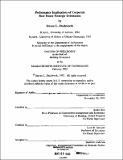Performance implications of corporate real estate strategic orientation
Author(s)
Duckworth, Steven L. (Steven Lee)
DownloadFull printable version (7.294Mb)
Alternative title
Performance implications of CRESCO
Advisor
Leon B. Groisser.
Terms of use
Metadata
Show full item recordAbstract
A central concept in strategic management is that congruence between organizational resources and environmental conditions is critical to performance. There are three basic types of organizational resources: human, monetary, and physical. How well a fIrm allocates these resources in pursuit of its product-market opportunities determines the level of congruence with its environment. Rapid technological change and shifting patterns of competition have put an intense strain on the ability of organizations to maintain such congruence. In spite of these pressures, limited attention has been given in both management theory and practice to the resource that is perhaps most apt to impair the adaptability of organizations, namely real estate. The objective of this study is to determine how the strategic orientation or profIle of a corporate real estate unit (i.e., its approach to problem solving, its risk propensity, its level of proactiveness, etc.) relates to performance. A six dimensional model of corporate real estate strategic orientation (labeled CRESO) is developed from various literatures and practitioner experiences. This model is validated based on key measurement criteria (e.g., theoretical and observational meaningfulness of concepts, internal consistency of operationalizations, convergent and discriminant validity, nomological validity) and then used to explore important relationships with two dimensions of corporate real estate performance, service and internal operations, and two dimensions of business performance, profItability and growth. This study contributes to the fIeld of corporate real estate by developing "valid" measures of corporate real estate strategic orientation along multiple theoretical dimensions, and by providing insight into the performance implications of different strategic orientations. Directions for future research in corporate real estate are also proposed.
Description
Thesis (Ph. D. in Building Economics)--Massachusetts Institute of Technology, Dept. of Architecture, February 1993. Includes bibliographical references (leaves 144-153).
Date issued
1993Department
Massachusetts Institute of Technology. Department of Architecture; Massachusetts Institute of Technology. Department of Urban Studies and PlanningPublisher
Massachusetts Institute of Technology
Keywords
Architecture, Urban Studies and Planning